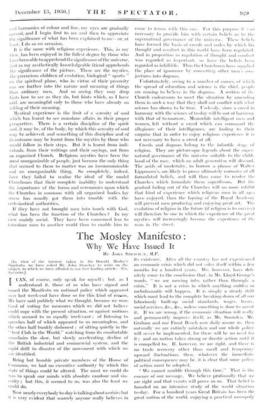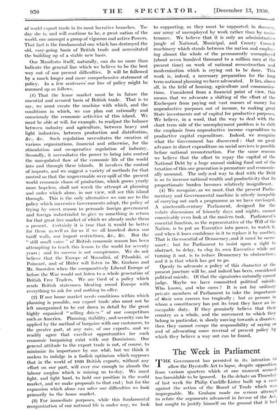The Mosley Manifesto :
Why We Have Issued It
By JOHN Sraxcluix, MT.
interest taken in Sir Oswald Mosley's [In view of the Manifesto, we have subject, to which wo Spectator.] I CAN, of course, only spask for myself ; but. as I understand it, those of its who have signed and issued the Manifesto on national policy which appeared
■ lver last week-end have done so for this kind or reason. We have said publicly what we thought, because we were tired of voting for measures which we (lid not believe vould cope with the present situation, or against motions which seemed to us equally irrelevant ; of listening to speeches half of which appeared to us meaningless. and the other half frankly dishonest ; of sitting quietly in the " best Club in the World," watching from its comfortable armchairs the slow, but slowly accelerating, decline of the British industrial and commercial system. and the rapid drift to disaster of the movement with which WC ;ire identified.
Being but humble private members of the House of Commons, we had no executive authority by which this state of things could be altered. The most we could do was to speak our minds with absolute candour and sin- cerity ; but this, it seemed to us, was also the least we could do.
Now nearly everybody to-day is talking about a crisis; but it is very evident that scarcely anyone really believes in its existence. After all the country has not experieneed
asked Mr. John Straehey to write on the an economic erisis which did not solve itself within a few
have Minded in our first lending article.—En. months for a hundred sears. We, however, have deli- nitely come to the conclusion that. in Mr. Lloyd George's words. " we are moving into. litither than through. a crisis." It is not a crisis in whiell anything sudden or melodramatic will happen. II is simply a steady drift which must lead to the complete breaking down of all our laboriously built-up social standards, wages. la mrs. social services, &c., &v., unless something is done to arrest it. If we arc wrong. if the economic situation will really and permanently improve itself, as Mr. Snowden. NIr. Graham and our Front Bench now daily assure us. I hen naturally we arc entirely mistaken and our whole policy will never be implemented, for there will be no need for it ; and no nation takes strong or drastic action until it is compelled to. If, however, we are right. and there is no trade recovery other than small and temporary upward fluctuations, then, whatever the immediate political consequence may be. it is clear that some pulley of action must be adopted.
" We cannot muddle through this time." That is the essence of our message. We believe profoundly that we are right and that events will prove us so. That belief is founded on an intensive study of the world situatioo to-day. For a hundred years Great Britain has been the great nation of the world, enjoying a practical monopoly
Of world export trade in its most lucrative branches. To day she is, and will continue to be, a great nation of the world, one amongst a group of vigorous and active Powers. That fact is the fundamental one which has destroyed the old, easy-going basis of British trade and necessitated the building up of a stable new basis.
Our Manifesto itself, naturally, can do no more than Indicate the general line which we believe to be the best way out of our present difficulties. It will be followed by a much longer and more comprehensive statement of policy. In a few sentences' our line of policy might be summed up as follows.
(1) That the home market must be in future the essential and secured basis of British trade. That is to say, we must create the machine with which, and the conditions in which, we can plan out rationally and consciously the economic activities of this island. We must be able at will, for example, to readjust the balance between industry and agriculture, between heavy and light industries, between production and distribution, &c., &c. Such regulation necessitates the creation of various organizations, financial and otherwise, for the stimulation and co-operative regulation of industry. Secondly, it necessitates the power to bring into control the unregulated flow of the economic life of the world into and through these islands. It involves the control of imports, and we suggest a variety of methods for that control so that the ungovernable over-spill of the present world economic chaos of production, which grows yearly more hopeless, shall not wreck the attempt at planning and order which alone, in our view, will see this island through. This is the only alternative we can sec to the policy which successive Governments adopt, the policy of trying by sweet reason to persuade foreign government and foreign industrialist to give us something in return for that great free market of which we already make them a present. Certainly it is true that it would be better for them as well as for us if we all knocked down our tariff walls, our import restrictions, &e., &e. But the " still small voice" of British economic reason has been attempting to teach this lesson to the world for seventy years ; and its success is not conspicuous. We do not believe that the Europe of Mussolini, of Pilsudski, of Poineare, and of Hitler will listen to Mr. Graham and Mr. Snowden when the comparatively Liberal Europe of before the War would not listen to a whole generatiOn of British Free Traders. We are tired of a policy which sends British statesmen bleating round Europe with everything to ask for and nothing to offer.
(2) If our home market needs conditions within which planning is possible, our export trade also must not be left unorganized to be cut down in detail by the great highly organised " selling drivcs " of our competitors such as America. Planning, stability, and security can be applied by the method of bargains with our customers, to the greater part, at any rate, of our .exports, and we readily agree that excellent opportunities for such economic bargaining exist with our Dominions. Our general attitude to the export trade is not, of course, to minimize its importance by one whit, but we think it useless to indulge in a foolish optimism which supposes that in the world of 1930 British exports, without any effort on our part, will ever rise enough to absorb the labour surplus which is ruining us to-day. We must fight, and fight hard, to hold our position in the world market, and we make proposals to that end ; but for the expansion which alone can solve our difficulties we look primarily to the home market.
(3) For immediate purposes, while this fundamental reorganization of our national life is under way, we look to supporting, as they must be supported: in decency, our army of unemployed by work rather than by main- tenance. We believe that it is only an administrative jungle of National, Municipal, and County Council machinery which stands between the nation and employ- ing almost the whole of the permanently unemployed (about seven hundred thousand to a million men at the present time) on work of national reconstruction and modernization which is crying out to be done. This work is, indeed, a necessary preparation for the long term national planning we have advocated. It lies, above all, in the field of housing, agriculture and communica- tions. Considered from a financial point of view, this means that we advocate a shifting of the effort of the Exchequer from paying out vast masses of money for unproductive purposes out of income, to making great State investments out of capital for productive purposes. We believe, in a word, that the way to deal with the short term side of the unemployment problem is to shift the emphasis from unproductive income expenditure to productive capital expenditure. Indeed, we recognize what the Government has discovered : that no great advance in direct expenditure on social services is possible before national reconstruction. For the same reasons we believe that the effort to repay the capital of the National Debt by a huge annual sinking fund out of the taxation of this one generation is premature and economic- ally unsound. The only real way to deal with the Debt is so to increase national wealth and productivity that its proportionate burden becomes relatively insignificant.
(4) We recognize, as we must, that the present Parlia- mentary and Governmental machine is utterly incapable of carrying out such a programme as we have envisaged. A nineteenth-century Parliament, designed for the sedate discussions of leisurely (lays and nights, cannot conceivably even look at the modern task. Parliament's essential function, as the representative of the Will of the Nation, is to put an Executive into power, to watch it, and when it loses confidence in it to replace it by another. That is the essential of Democracy, and it must be sacro- sanct; but for Parliament to insist upon a right to obstruct, to delay, to clog its own Executive while not turning it out, is to reduce Democracy to obstruction ; and it is that which has got to go.
Openly to advocate a policy of this character at the present juncture will be, and indeed has been, considered political suicide. Of that the signatories naturally cannot judge. Maybe we have committed political' suicide. Who knows, and who cares ? It is not for ordinary private members of Parliament to take the importance of *heir own careers too tragically ; but as persons in whom a constituency has put its trust they have an in- escapable duty. If they genuinely believe that their country as a whole, and the movement to which they belong in particular, is slowly moving towards a disaster, then they cannot escape the responsibility of saying so and of advocating some reversal of present policy by which they believe a way out can be found.















































 Previous page
Previous page